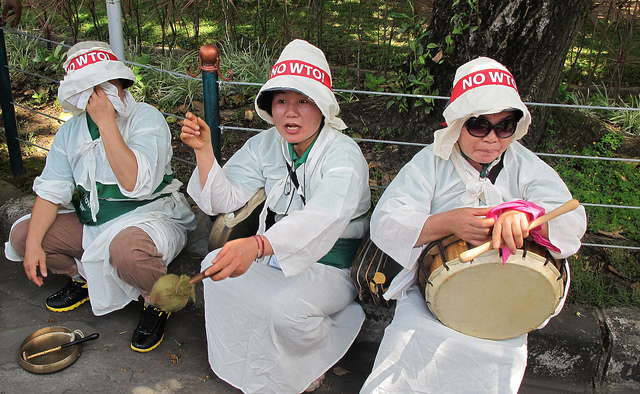
Photo © Benny Kuruvilla
Bali, Indonesia hosted the 9th Ministerial Conference (MC 9) of the World Trade Organization this December 3-6. The ‘Bali Package’ was discussed by the conference delegates and focused on greater liberalization in agriculture, acceleration of least-developed countries into the WTO, and expediting trade facilitation through the restructuring of GATT articles on imports-exports and trade costs.
As Pablo Solon, Executive Director of Focus on the Global South and former Bolivian Ambassador to the United Nations, stated in a press release from Social Movements for an Alternative Asia, “It is clear that the Bali Package is a way to revive the WTO in order for it to find new ways of growing global trade. But this will only lead to the further over-exploitation of finite resources and the concentration of wealth in fewer hands.”
Also, in Bali, a different space was created by the world’s Indigenous Peoples, where their own workshops and events ran parallel to the WTO MC 9. The alternative space was organized by The International Organization for Self-Determination and Equality, the International Indigenous Peoples Movement for Self-Determination and Liberation, Cordillera Peoples’ Alliance, Asia Pacific Indigenous Youth Network, Centre for Research and Advocacy-Manipur, Committee on the Protection of Natural Resources in Manipur, and Land is Life.
Titled: “Indigenous Peoples and the WTO: Resisting Globalization, Asserting Self-Determination”, Indigenous Peoples gathered to build deeper understanding and awareness of the WTO and neoliberal globalization and its impacts on Indigenous peoples, to create a forum for exchange and learning on the impacts of the WTO on Indigenous peoples and how to confront these, as well as to prepare a Unity Statement or Declaration of Indigenous Peoples that would be submitted to the WTO MC 9.
Photos © Benny Kuruvilla
This Declaration creates an agreement among the Indigenous participants, as well as other Indigenous Peoples’ rights advocates, environmental organizations, human rights organizations, and other civil society organizations to resist the neoliberal globalization pushed by the WTO and to assert Indigenous Peoples’ right to self-determination.
The WTO states that its: “founding agreement recognizes sustainable development as a central principle”, however, the Indigenous Peoples’ Declaration maintains that “until our right to self-determination is respected, genuine sustainable development will not be achieved”.
The negotiation of agreements at the WTO have consistently ignored the participation of Indigenous Peoples. This has caused detrimental impacts to Indigenous Peoples; destroying biological and cultural diversity, ecosystems, values and traditional knowledge. The agreements made have ignored and contributed to the climate crisis, which exacerbates the historical, political, and economic marginalization of Indigenous Peoples.
The Indigenous Conference demanded “for the repeal of all trade agreements affecting us without our meaningful, full and effective participation and Free, Prior and Informed Consent… Nothing About Us, Without Us!”
The Indigenous Peoples’ Declaration asserts:
“We push for an alternative trade system appropriate for us. We do not just reject trade per se, but push for trade systems that respect and recognize our traditional economies and governance… We demand systems that underpin our inherent right to self-determination and our permanent sovereignty over our traditional lands, territories and resources, forests, water, and everything that sustains life for the future generations”
This Declaration builds on the International Cancun Declaration of Indigenous Peoples, which came out of Indigenous organizing of alternative spaces during the 5th Ministerial Conference of the WTO in Cancun, Mexico in 2003. The Cancun Declaration details various circumstances where WTO agreements have worsened Indigenous Peoples’ situations. Both Declarations assert the right of self-determination.
The global Indigenous movement has seen some great achievements in its participation in international processes. In the last decade the UN Declaration on the Rights of Indigenous Peoples was signed, and the Permanent Forum on Indigenous Issues and the Expert Mechanism on the Rights of Indigenous Peoples were both established. As the invitation from The International Indigenous Peoples Movement for Self-determination and Liberation states: “we should also engage the WTO and other regional trade syndicates and strongly register our opposition to agreements forged without our knowledge, participation, and consent.”

Indigenous Peoples are putting their bodies on the line and it's our responsibility to make sure you know why. That takes time, expertise and resources - and we're up against a constant tide of misinformation and distorted coverage. By supporting IC you're empowering the kind of journalism we need, at the moment we need it most.